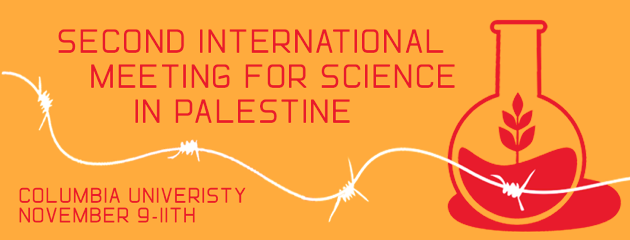From November 9th through 11th, 2018 Scientists for Palestine and many other members of the international scientific community, will gather at Columbia University in the City of New York for….

From November 9th through 11th, 2018 Scientists for Palestine and many other members of the international scientific community, will gather at Columbia University in the City of New York for a weekend-long meeting involving multiple plenary and parallel sessions. The event is co-sponsored by the Center for Palestine Studies at Columbia University, Columbia Students for Justice in Palestine, Science for the People and Within our Lifetime • United for Palestine. This will be Scientists for Palestine’s second international gathering, after a similar initiative hosted earlier this year at the University of Cambridge, UK.
The event is only open for registered participants, if you would like to participate please fill out the application form. The application deadline is October 30th 2018. Up to date information will be available in the gathering’s webpage, and on the Facebook event.
Participants are expected to make their own travel and accommodation arrangements.
The goal of the workshop is to reaffirm the vision of Scientists for Palestine and establish new and ambitious objectives for scientific collaboration between the Palestinian and the international community, transcending the limitations caused by 50 years of ongoing occupation. The topics that will be discussed will vary widely, ranging from strategy sessions on current status of science in Palestine, to educational discussions on the challenges of doing science under the occupation with the goal of developing concrete opportunities for international scientists to get involved, to scientific presentations from many Palestinian and International young scientists.
WHY INTERNATIONAL MEETINGS?
International meetings for science in Palestine are essential to break the international isolation of the Palestinian academic community and to ensure a brighter future for Palestinian science. Though science has a strong tradition in Palestine, higher education and research faces many challenges. Some common to many countries, such as lack of funding and heavy teaching loads for professors, but many unique challenges are from the ongoing occupation of the West Bank and Gaza, including restrictions on mobility of students and academics, international isolation, raids and forced closures of Palestinian universities and other scientific institutions, and indictment or imprisonment without trial of individual academics.
SCIENTISTS FOR PALESTINE
Nevertheless, interest in physics education and research in Palestine continues to grow rapidly not only within Palestine but also throughout the international scientific community. In December 2015, Palestine signed an International Cooperation Agreement with CERN, signaling Palestine’s increasing involvement in cutting-edge scientific research at one of the best laboratories in the world. Very recently 15 among the most famous physicists in the world, including a Nobel laureate and a Fields medalist, signed a letter condemning the use of science to normalize the military occupation of the West Bank.
To help meet the rapidly increasing demand for high-level scientific education and collaboration in Palestine, physicists from around the world created Scientists for Palestine, an international group whose goals are to promote and support science in Palestine and to help integrate Palestine into the international scientific community. Among the groups’ initiatives is the establishment of the Palestinian Advanced Physics School (PAPS) as a regular event (see here, here and here), and plans for many further schools, conferences, workshops, and other scientific activities in Palestine.
